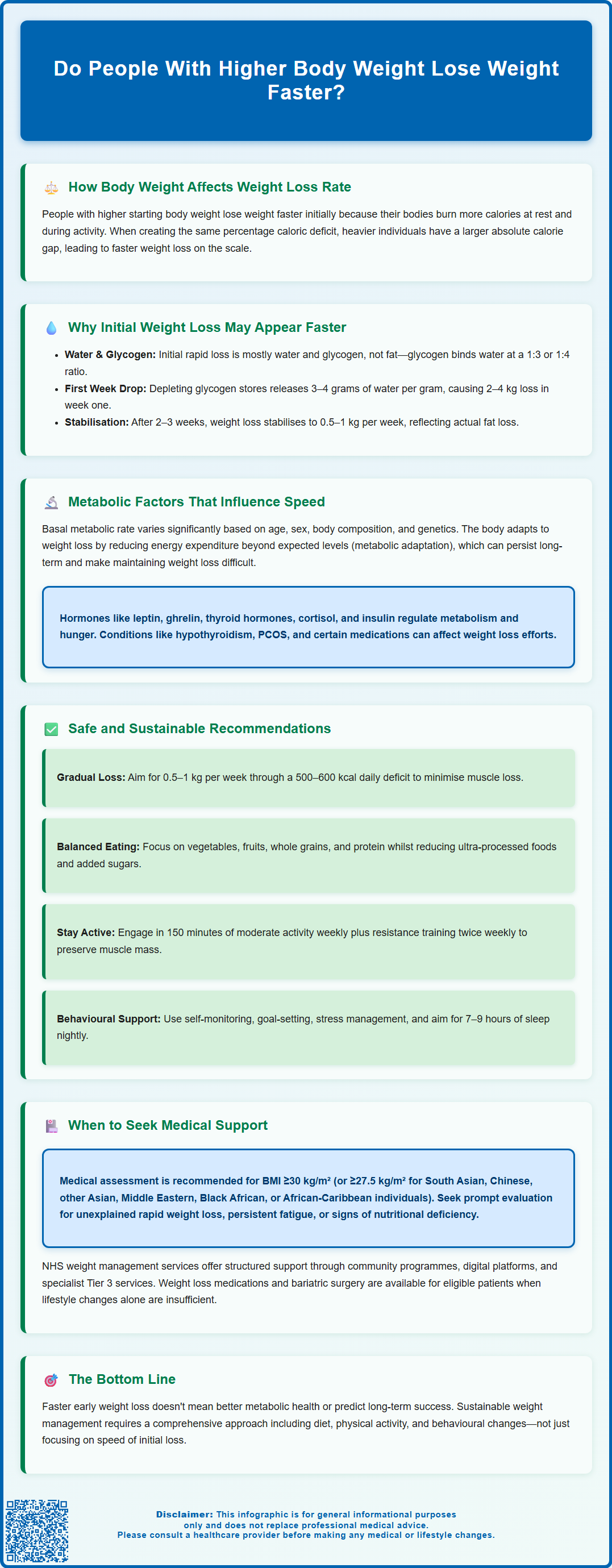Individuals with higher body weight often experience more rapid initial weight loss compared to those starting at lower weights, a phenomenon rooted in fundamental metabolic principles rather than differences in effort. This occurs primarily because larger bodies require more energy for basic functions and movement, creating a larger absolute caloric deficit when dietary changes are implemented. However, faster initial weight loss does not guarantee superior long-term outcomes, and much of the early dramatic reduction reflects temporary water and glycogen loss rather than fat loss alone. Understanding these physiological realities helps set realistic expectations for sustainable weight management.
Summary: People with higher body weight typically lose weight faster initially due to greater total daily energy expenditure, creating larger absolute caloric deficits, though much early loss reflects water and glycogen rather than fat.
- Individuals with greater body mass expend more energy maintaining physiological functions and movement, resulting in larger absolute caloric deficits when dietary changes are implemented.
- Initial rapid weight loss primarily reflects glycogen depletion and associated water loss (glycogen binds water at approximately 1:3 or 1:4 ratio), not solely fat reduction.
- NICE recommends sustainable weight loss of 0.5–1 kg weekly through multicomponent approaches including dietary modification, physical activity, and behavioural strategies.
- Adaptive thermogenesis causes metabolic slowdown as weight decreases, reducing energy expenditure beyond what loss of body mass alone would predict.
- Medical assessment is recommended for BMI ≥30 kg/m² (or ≥27.5 kg/m² for certain ethnic groups), with pharmacological or surgical interventions available through specialist NHS services for eligible patients.
Table of Contents
How Body Weight Affects Weight Loss Rate
The relationship between starting body weight and weight loss rate is well-established in clinical research. Individuals with higher initial body weight typically experience more rapid absolute weight loss in the early stages of a weight management programme compared to those starting at lower weights. This phenomenon reflects fundamental principles of energy metabolism and thermodynamics rather than differences in effort or commitment.
The primary mechanism underlying this observation relates to total daily energy expenditure (TDEE). Individuals with greater body mass require more energy to maintain basic physiological functions—including cellular metabolism, cardiovascular function, respiration, and thermoregulation—as well as to support movement and physical activity. A person weighing 120 kg, for example, expends considerably more energy performing the same activities as someone weighing 70 kg, simply due to the increased metabolic demands of maintaining and moving a larger body mass.
When a caloric deficit is created through dietary modification or increased physical activity, the absolute energy gap tends to be larger in individuals with higher body weight. If two people create the same percentage caloric deficit (e.g., 20% below maintenance), the person with higher TDEE will have a larger absolute deficit in kcal. Since approximately 7,700 kcal (32,300 kJ) equals one kg of fat tissue (though this is an approximation that varies with body composition and metabolic adaptations), a larger daily deficit typically translates to faster initial weight loss on the scales.
It is crucial to understand, however, that faster initial weight loss does not indicate superior metabolic health or guarantee long-term success. The rate of weight loss naturally slows as body weight decreases and energy requirements decline. Sustainable weight management requires a comprehensive approach addressing dietary patterns, physical activity, behavioural factors, and, where appropriate, medical intervention.
Why Initial Weight Loss May Appear Faster
The dramatic weight loss often observed in the first weeks of a weight management programme is not entirely attributable to fat loss. Understanding the composition of early weight changes helps set realistic expectations and prevents discouragement when the rate inevitably slows.
Glycogen depletion accounts for a substantial portion of initial weight loss. Glycogen, the storage form of glucose in liver and muscle tissue, is bound to water at a ratio of approximately 1:3 or 1:4. When caloric intake decreases, particularly carbohydrate intake, the body mobilises glycogen stores for energy. Each gram of glycogen released is accompanied by 3–4 grams of water, resulting in rapid scale weight reduction. An individual may lose 2–4 kg in the first week primarily through glycogen and associated water loss, though this varies considerably based on starting diet, baseline glycogen stores, sex, and activity levels. This explains why this initial pace cannot be maintained.
Additionally, dietary changes often reduce sodium intake and overall food volume in the gastrointestinal tract, both contributing to decreased water retention and lower scale weight. Processed foods, which many people reduce when starting a weight loss programme, are typically high in sodium, and their elimination leads to reduced fluid retention.
For individuals with higher body weight, these effects may be more pronounced due to larger glycogen stores and greater total body water. After the first 2–3 weeks, weight loss rate typically stabilises to reflect actual fat loss, which occurs more gradually. NHS and NICE guidance suggests that a realistic and healthy rate of weight loss is 0.5–1 kg per week, though this varies based on individual circumstances.
Understanding these physiological realities helps maintain motivation when the initial rapid loss slows to a more sustainable pace, which is actually indicative of genuine fat loss rather than temporary fluid shifts.

Metabolic Factors That Influence Weight Loss Speed
Multiple metabolic variables influence individual weight loss rates beyond starting body weight. Basal metabolic rate (BMR)—the energy expended at complete rest—varies considerably between individuals due to factors including age, sex, body composition, and genetic influences. Muscle tissue is metabolically active, requiring more energy to maintain than adipose tissue, so individuals with greater lean muscle mass typically have higher BMRs and may find weight loss somewhat easier.
Adaptive thermogenesis represents a significant metabolic consideration in weight management. As weight decreases, the body adapts by reducing energy expenditure beyond what would be predicted by the loss of body mass alone. This metabolic adaptation, sometimes termed "metabolic slowdown," is a protective mechanism that evolved to prevent starvation. Research indicates this adaptation can persist long-term, making weight maintenance challenging. The degree of adaptation varies between individuals and may be more pronounced following very rapid weight loss or very low-energy diets.
Hormonal factors substantially influence weight loss rate and hunger regulation. Leptin, produced by adipose tissue, signals energy sufficiency to the brain; as fat stores decrease, leptin levels fall, potentially increasing appetite and reducing energy expenditure. Ghrelin, the "hunger hormone," often increases during caloric restriction. Thyroid hormones, cortisol, and insulin all play regulatory roles in metabolism and energy balance. Certain medical conditions affecting these hormonal systems—including hypothyroidism, polycystic ovary syndrome (PCOS), and Cushing's syndrome—can impair weight loss efforts.
Medications may also influence weight loss rate. Some commonly prescribed drugs are associated with weight changes. Weight-increasing medications can include certain antidepressants, antipsychotics, corticosteroids, insulin, and some diabetes medications (such as sulfonylureas). Conversely, some medications may support weight loss, including certain diabetes treatments (GLP-1 receptor agonists, SGLT2 inhibitors). These medicines can affect weight management, but patients should never discontinue prescribed medications without consulting their GP or specialist. A medicines review may be appropriate for those struggling with weight management. If you suspect a side effect from any medicine, you can report it through the MHRA Yellow Card scheme.
Safe and Sustainable Weight Loss Recommendations
NICE guidelines emphasise that sustainable weight management requires a multicomponent approach rather than focusing solely on rapid weight loss. The recommended rate of weight loss for most adults is 0.5–1 kg per week, achieved through a daily energy deficit of approximately 500–600 kcal. This moderate approach minimises muscle loss, reduces the risk of nutritional deficiencies, and is more likely to result in long-term weight maintenance.
Dietary modifications should focus on overall eating patterns rather than severe restriction. Evidence supports approaches that emphasise:
-
Increased consumption of vegetables, fruits, and whole grains for fibre and micronutrients
-
Regular inclusion of protein sources at each meal to help preserve muscle mass during weight loss (individual requirements vary; consider consulting a registered dietitian for personalised advice)
-
Reduction of ultra-processed foods, added sugars, and saturated fats
-
Portion awareness without requiring meticulous calorie counting for most individuals
-
Regular meal patterns to support appetite regulation
Physical activity is essential for both weight loss and long-term maintenance. UK Chief Medical Officers' guidelines recommend adults aim for at least 150 minutes of moderate-intensity activity weekly, with additional benefits from resistance training twice weekly to preserve muscle mass. For individuals with higher body weight or limited mobility, starting with low-impact activities such as walking or swimming and gradually increasing intensity is appropriate.
Behavioural strategies significantly improve outcomes. These include self-monitoring (food diaries or apps), goal-setting, identifying and managing triggers for overeating, stress management, and adequate sleep (7–9 hours nightly). Sleep deprivation disrupts appetite-regulating hormones and is associated with weight gain.
Very low-energy diets (VLEDs) providing 800 kcal or less daily may be appropriate for some individuals with obesity under close medical supervision, particularly those with obesity-related complications requiring rapid weight loss. However, these require careful monitoring, nutritional supplementation, and a structured refeeding and maintenance plan. VLEDs are not suitable during pregnancy or for children/adolescents, and may require adjustment of medications (particularly for diabetes).
When to Seek Medical Support for Weight Management
Medical assessment is recommended for individuals with a BMI of 30 kg/m² or above, or 27.5 kg/m² or above for people of South Asian, Chinese, other Asian, Middle Eastern, Black African, or African-Caribbean family origin (who face increased health risks at lower BMI thresholds, as per NICE guidance). Waist circumference (>94cm for men or >80cm for women, with ethnicity-specific thresholds) provides an additional risk marker. GP consultation is also appropriate for anyone struggling with weight management despite lifestyle modifications, or those with obesity-related health conditions.
Certain symptoms warrant prompt medical evaluation during weight loss efforts:
-
Unexplained rapid weight loss (more than 5% of body weight in 6–12 months without trying) – this may require urgent assessment under NICE suspected cancer referral guidelines (NG12)
-
Persistent fatigue, cold intolerance, or hair loss (potential thyroid dysfunction)
-
Excessive thirst, frequent urination, or blurred vision (possible diabetes)
-
Chest pain, severe breathlessness, or palpitations during physical activity
-
Signs of nutritional deficiency including unusual bruising, bleeding gums, or muscle weakness
NHS weight management services provide structured support including dietary advice, physical activity programmes, and behavioural interventions. These include community-based Tier 2 services, the NHS Digital Weight Management Programme, and Tier 3 specialist weight management services offering multidisciplinary care for individuals with complex needs, including psychological support and management of obesity-related complications.
Pharmacological interventions may be considered when lifestyle modifications alone are insufficient. Orlistat, which reduces dietary fat absorption, is available through the NHS for eligible patients. Newer medications include GLP-1 receptor agonists such as semaglutide (Wegovy), which NICE now recommends for weight management in adults with at least one weight-related condition and a BMI of at least 35 kg/m² (or 32.5 kg/m² for certain ethnic groups), or a BMI of 30 kg/m² (27.5 kg/m² for certain ethnic groups) with exceptional circumstances. These medications are prescribed through specialist weight management services subject to specific eligibility criteria.
Bariatric surgery represents an evidence-based option for individuals with BMI ≥40 kg/m² or ≥35 kg/m² with obesity-related complications who have not achieved adequate weight loss through other methods. Lower BMI thresholds (≥30 kg/m²) may apply for people with recent-onset type 2 diabetes, with ethnicity-specific adjustments. Procedures such as gastric bypass or sleeve gastrectomy require lifelong dietary modifications and medical follow-up but can result in substantial, sustained weight loss and improvement in obesity-related conditions. Referral criteria and access vary by local integrated care board, and patients should discuss eligibility with their GP.
Frequently Asked Questions
Why do people with higher body weight lose more weight initially?
Individuals with higher body weight have greater total daily energy expenditure, requiring more energy for basic physiological functions and movement. When a caloric deficit is created, the absolute energy gap is larger, typically resulting in faster initial weight loss, though much of this early reduction reflects water and glycogen loss rather than fat alone.
What is a safe rate of weight loss according to NHS guidance?
NICE guidelines recommend a sustainable weight loss rate of 0.5–1 kg per week for most adults, achieved through a daily energy deficit of approximately 500–600 kcal. This moderate approach minimises muscle loss, reduces nutritional deficiency risk, and improves long-term weight maintenance outcomes.
When should I seek medical support for weight management?
Medical assessment is recommended for BMI ≥30 kg/m² (or ≥27.5 kg/m² for people of South Asian, Chinese, other Asian, Middle Eastern, Black African, or African-Caribbean family origin), when struggling with weight management despite lifestyle changes, or if experiencing obesity-related health conditions. Unexplained rapid weight loss warrants prompt GP evaluation.
The health-related content published on this site is based on credible scientific sources and is periodically reviewed to ensure accuracy and relevance. Although we aim to reflect the most current medical knowledge, the material is meant for general education and awareness only.
The information on this site is not a substitute for professional medical advice. For any health concerns, please speak with a qualified medical professional. By using this information, you acknowledge responsibility for any decisions made and understand we are not liable for any consequences that may result.
Heading 1
Heading 2
Heading 3
Heading 4
Heading 5
Heading 6
Lorem ipsum dolor sit amet, consectetur adipiscing elit, sed do eiusmod tempor incididunt ut labore et dolore magna aliqua. Ut enim ad minim veniam, quis nostrud exercitation ullamco laboris nisi ut aliquip ex ea commodo consequat. Duis aute irure dolor in reprehenderit in voluptate velit esse cillum dolore eu fugiat nulla pariatur.
Block quote
Ordered list
- Item 1
- Item 2
- Item 3
Unordered list
- Item A
- Item B
- Item C
Bold text
Emphasis
Superscript
Subscript












